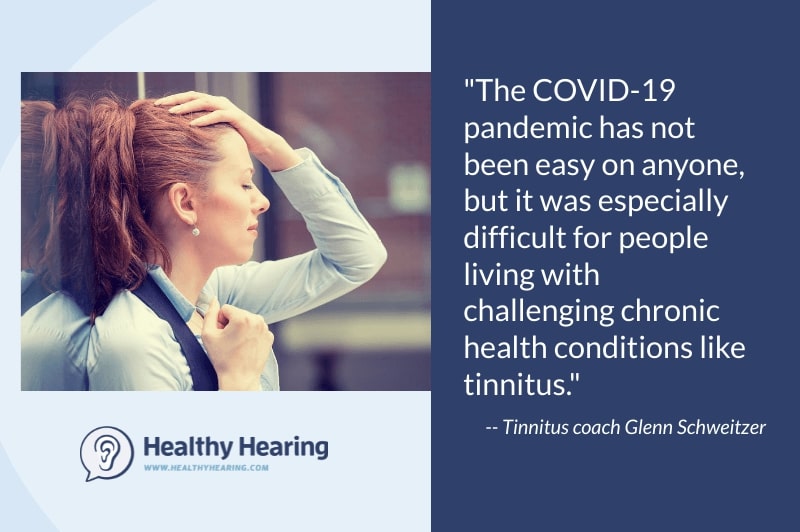The COVID-19 pandemic has not been easy on anyone, but it was especially difficult for people living with challenging chronic health conditions like tinnitus.

Over the last seven years, I’ve worked one-on-one with more than 900 tinnitus sufferers from all over the world as a tinnitus coach, many of whom I met during the pandemic.
When the lockdowns first began in Asia, Europe, and then the US, I was overwhelmed by the amount of suffering I witnessed in the tinnitus community. My email inbox became flooded with messages and questions from tinnitus patients in despair. And it didn’t let up for a long time.
You couldn’t have asked for a more perfect set of circumstances to make life miserable for tinnitus sufferers. The social isolation, uncertainty, the 24-hour anxiety-fueled news cycle, financial instability, disruption of normal routines, and the inability to easily see doctors and specialists caused untold suffering in the lives of tinnitus patients worldwide.
Of course, I realize that the pandemic is still ongoing. But as I reflect on the last few years, I realize that my work as a tinnitus coach gave me a unique vantage point. And it offered me a chance to learn lessons that have directly translated into better tools and strategies for tinnitus sufferers.
Understanding the impacts of stress
Stress is a symptom trigger for most chronic illnesses and tinnitus is no exception. Increases in stress can cause tinnitus to spike for most sufferers, with changes in sound, volume, or intrusiveness.
I’ve always taught a wide variety of tools and strategies for reducing stress and anxiety levels when working with tinnitus patients. But during the pandemic, I learned that you need to consider stress in all its forms when looking to mitigate its effect on tinnitus.
Here is a helpful way to conceptualize the problem. Imagine that your personal capacity to manage stress is a big metal tank located somewhere in your brain. The tank represents the amount of stress you can safely tolerate on any given day. If your stress level rises to the point where the tank overflows, you will experience anxiety or other negative health impacts.

Here’s the problem: For many sufferers, the stress of tinnitus alone can completely fill and overflow the tank. But even when your tinnitus-related stress is not overflowing the tank, it still may be taking up a large percentage of the space. And so other stressors that would normally not affect you at all become enough to tip the scales and put you over the top into a state of anxiety.
As people make progress with habituation and begin to find relief from their tinnitus, their capacity to handle other stressors will increase.
But stress comes in many shapes and sizes, and it’s rarely ever just the stress of tinnitus itself that you need to consider. Too much stress can pump the brakes on your progress with habituation. More tips for managing pandemic-related stress and tinnitus.
The many faces of stress
When COVID first began to spread, it was all the news could talk about for a very long time. It was scary in those early days. Case numbers were rising fast, and people were dying all over the world. Actionable medical information was virtually nonexistent. Uncertainty and anxiety coursed through the veins of society.
News networks around the world endlessly pumped this fear into our TVs and social media feeds creating stress that wreaked havoc on our health at a time when we couldn’t actually see our doctors. It was hard to pull away from the news feeds.
And then the entire world economy shut down in a way that most people believed impossible before it happened. Businesses collapsed and millions of people lost their jobs. The societal stress we all felt was bad enough, but for many people, the financial stress was the worst stress of all.
Tinnitus alone can be enough to strain personal relationships. But the pandemic added fuel to this fire. Lockdowns destroyed our normal routines, and everyone was suddenly faced with one of two difficult social dynamics–complete social isolation or having to spend every waking hour with your family members or roommates.
Even good stress can become bad stress
Even good stress–like exercise–can become bad stress if you aren’t adequately managing your stress levels. You don’t get stronger while you lift weights or go for a run. You get stronger when you sleep and recover. But if you aren’t sleeping enough to recover from your workouts (and all the other stress you are experiencing), intense exercise can overload an already overloaded nervous system and lead to negative health outcomes.
Unfortunately, the world isn’t becoming more stable as the pandemic wanes. The news is still pumping fear into society as war, partisanship, global supply chain shortages, climate change, drought, food shortages, economic recession, and inflation run rampant all over the world.
When you live with tinnitus in times like these, managing stress in all its forms is critical for recovery.
The COVID-tinnitus-vaccine correlation
There has been a lot of good reporting on tinnitus being a long-haul symptom of COVID itself, and a potential side effect of the vaccines. I’m not going to weigh in on the research, but I feel that my role as a tinnitus coach has given me an interesting point of view on the matter.
Throughout the pandemic, I worked with many tinnitus patients who either experienced new tinnitus or worsening of existing tinnitus immediately after receiving one of the vaccines. I also worked with many people whose tinnitus started or worsened after catching the virus.
Many different infections are linked to hearing loss and tinnitus. It was always difficult to figure out exactly what was happening in these cases, but I saw it enough to know it’s a real phenomenon affecting people, even if ultimately rare from a number’s perspective.
In my experience working with tinnitus sufferers during the pandemic, habituation was always still 100% possible and no more difficult than habituating to tinnitus caused by any other means.
In every case, it was always a difficult pill to swallow, especially for the people experiencing tinnitus following vaccination. The vaccines were supposed to be a kind of finish line to one of the most difficult experiences of our lives, but for some, it became the starting line of a whole different problem.
The good news is that as difficult as this situation was for everyone who experienced it, it was not an insurmountable obstacle preventing habituation or relief.
So if you or someone you care about experienced tinnitus following the vaccines or COVID itself, there is still hope! In my experience working with tinnitus sufferers during the pandemic, habituation was always still 100% possible and no more difficult than habituating to tinnitus caused by any other means.
Coping with tinnitus when there is nothing to do

spikes.
For most people, the lockdowns were the most difficult part of the pandemic. This is especially true for tinnitus sufferers. There was so much to worry about at a time where there was nowhere to go to relieve stress. Parents who could work from home had to find a way to become teachers and caregivers while working their jobs. Even many playgrounds and parks were closed.
When you’re suffering from tinnitus, distractions can be a powerful way to cope. Even people acutely suffering from severe tinnitus can become distracted from their tinnitus periodically as they go about their day.
But then lockdowns destroyed our normal routines. And even the people who had long been managing their tinnitus well, suddenly found themselves struggling to cope.
So how do you distract yourself from tinnitus when there is nothing to do? And how do you cope when there is nowhere to go? What tools work best?
The pandemic forced me to spend a lot of time thinking about these questions. And a few of the solutions I found can help you better cope with tinnitus even in the best of times.
The strategies are simple but not obvious. Here are a few strategies you can put into practice.
Combine coping tools whenever possible
One of the simplest ways you can improve your ability to cope with tinnitus is by combining multiple coping tools, strategies, and techniques together. And the more senses you involve in any act of coping, the greater the distraction will become.
Here’s a helpful way to think about it. A friend and colleague of mine, Dr. Ben Thompson, who is an audiologist and the founder of Treble Health, has described tinnitus as like being in a pitch black, silent room with someone shining a small flashlight in your eyes. It’s all you would be able to see or think about. Sound masking, he says, is like turning on a lamp in the room. You can still see the flashlight, but you can see everything else now, too.
I love this analogy, but I like to take it a step further. By combining additional tools, it’s like inviting all of your friends over into the room for a night of partying, food, and music. You can still see the flashlight when you look at it, but you’re probably not going to notice it with everything else going on.
Small distractions can be enough
More often than not, deliberate small distractions can be enough to help you cope. This is especially true when combining coping tools.

meditating can help distract you from the
ringing in your ears.
If you live with your family or even roommates, it can be as simple as having a Netflix show you watch together in the evening.
So don’t just take a hot bath–put on your favorite album, light a strong scented candle, and try progressive muscle relaxation or body scan meditation at the same time.
Don’t just do breathing exercises, put on relaxation music at the same time. This column of mine explores these relaxation concepts in more depth.
Don’t just browse social media, play a puzzle game on your phone while listening to a podcast or audiobook.
You can even put on sound masking, like nature sounds or broadband sounds like white noise, while watching TV if it helps you to focus. (This can be extremely effective and is something that very few people intuitively think to try). And of course, if you have access to it, cognitive-behavioral therapy and tinnitus sound therapy can be both quite helpful for tinnitus, too.
When there’s nothing to do, learn something new
It’s hard to find the enthusiasm and energy required to learn a new skill when struggling with a difficult health problem like tinnitus. But picking up a new hobby can be a hugely valuable coping technique, especially when there’s nothing to do.
In the months leading up to the pandemic, I was taking classes to learn to draw at the local art school here in town. I loved it and was practicing and getting better every day until the lockdowns forced the art school to close its doors.
I tried to continue learning on my own and found it difficult. But I also knew how much enjoyment it had given me, and I wanted something new to try. And so I put the pencils down for a bit and picked up a gift my wife had given me years earlier that I had ignored until this point–the ukulele.
Every day I practiced and learned new songs, and it became an incredible distraction and refuge from the chaos and stress of the pandemic.
I’ve played guitar for years but decided it would be fun to learn a new instrument. Plus, I already had one in my possession and so I started learning. And it became a small obsession. Every day I practiced and learned new songs, and it became an incredible distraction and refuge from the chaos and stress of the pandemic.
Final thoughts
COVID affected the world in unthinkable ways, and we still haven’t fully healed from the damage. It’s almost hard to believe that the pandemic is still ongoing. But its acutely negative impact on tinnitus sufferers has greatly diminished as life has returned to a new-normal in most places.
The lockdowns are (mostly) behind us, and we now have vaccines, new therapeutics, and better treatment outcomes.
Looking back, the last few years of working with tinnitus patients were the most challenging of my career. But the lessons I learned along the way have made me a better tinnitus coach. And I hope you find my insights helpful on your own personal journey with tinnitus as well.
from WordPress https://ift.tt/BQVeMJW
via IFTTT


0 Comments